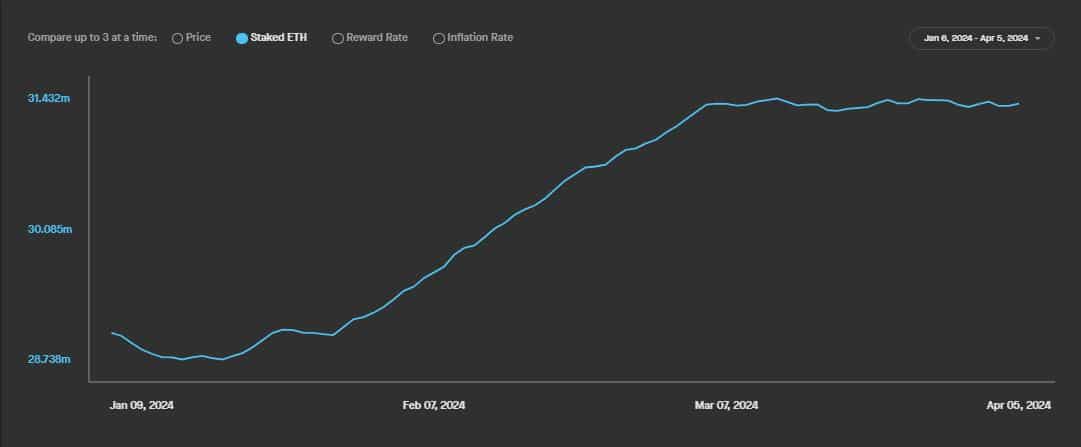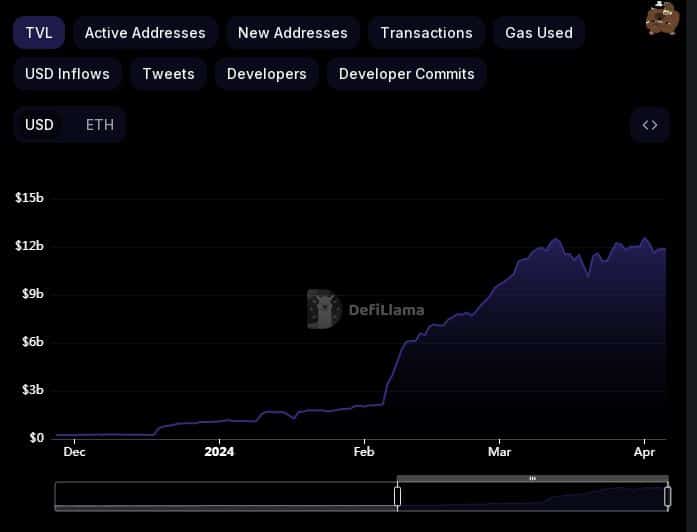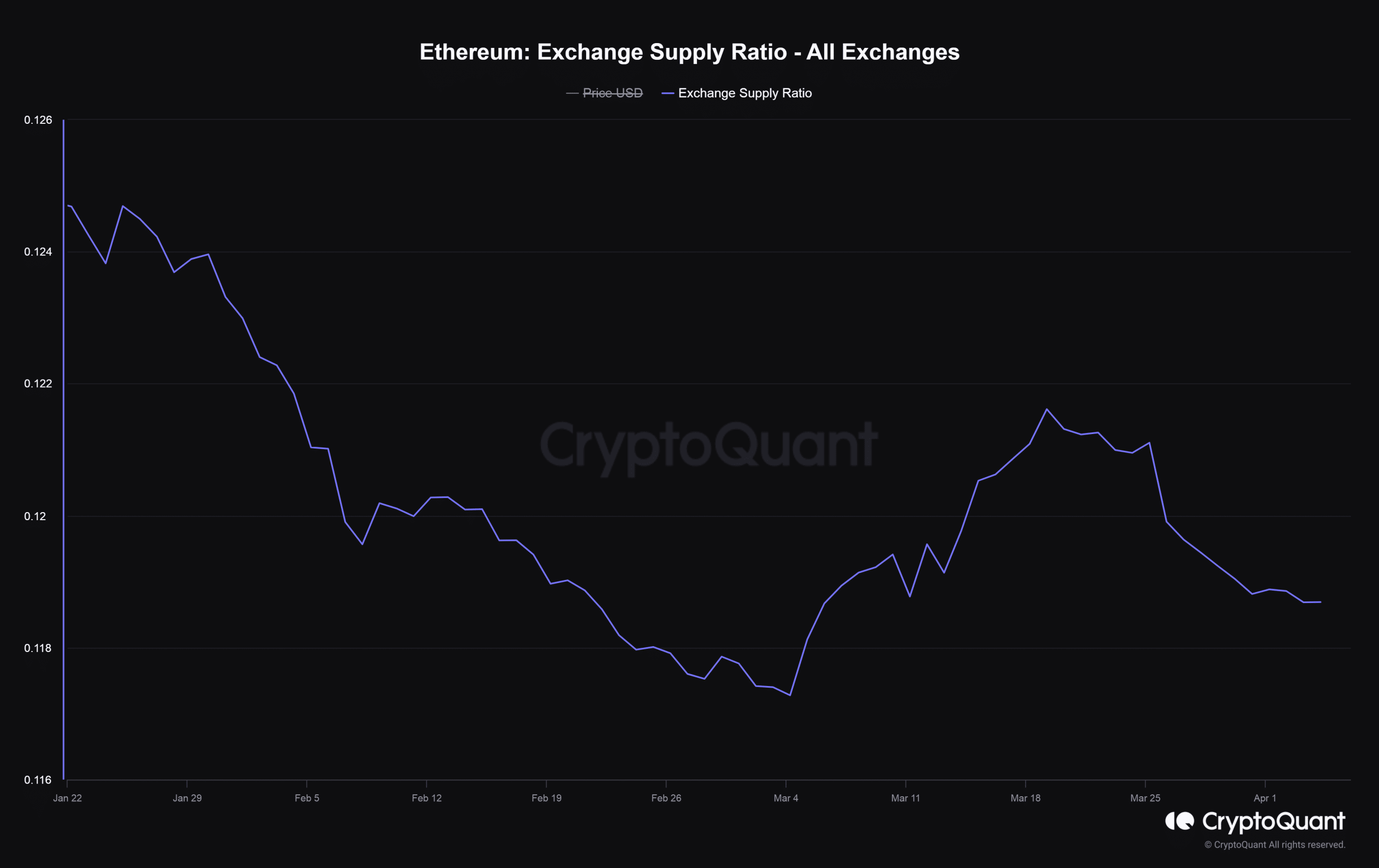- More than 12% of the staked ETH has been restaked
- ETH is now gradually emerging as a reliable yield-bearing asset
Ethereum [ETH] staking has become much more desirable since the concept of restaking was introduced.
A new paradigm for Ethereum staking
According to AMBCrypto’s analysis of Staking Rewards’ data, ETH locked on the network has risen by 9% over the last three months. In fact, its growth rate has gone parabolic since February began.

Source: Staking Rewards
Interestingly, according to DeFiLlama, EigenLayer, the success story of the restaking narrative, noted a similar growth curve in its total value locked (TVL).

Source: DeFiLlama
Additionally, Tom Wan, a research analyst at Web3 firm 21.co, revealed recently that over 12% of the staked Ether has already been restaked.
These findings have strengthened the assertion made previously about restaking providing an impetus to ETH staking.
Why are users leaning towards restaking?
EigenLayer has taken a giant leap in 2024, surpassing competitors to become the second-largest DeFi protocol in a very short period of time. The success lies in its unique offering – Restaking.
Restaking involves reusing staked ETH to extend security to other applications other than Ethereum. No prizes for guessing this allows stakers to earn extra rewards on their deposited holdings. As yields on conventional ETH staking continue to drop owing to an increase in participants, restaking is a viable option for users to boost their income.
How does ETH benefit?
Overall, both staking and restaking underscore an important broader idea – ETH as a yield-bearing asset. With stable, guaranteed returns, users can start viewing it from a long-term prospective, rather than seeking short-term gains from its price fluctuations in the market.
Is your portfolio green? Check out the ETH Profit Calculator
Interestingly, the results can already be felt. Ethereum’s exchange supply ratio, for instance, plummeted to multi-year lows, according to AMBCrypto’s analysis of CryptoQuant data.
This could gradually lead to a scarcity in the market, which when matched by growing demand, could exert positive pressure on ETH’s price.

Source: CryptoQuant
- More than 12% of the staked ETH has been restaked
- ETH is now gradually emerging as a reliable yield-bearing asset
Ethereum [ETH] staking has become much more desirable since the concept of restaking was introduced.
A new paradigm for Ethereum staking
According to AMBCrypto’s analysis of Staking Rewards’ data, ETH locked on the network has risen by 9% over the last three months. In fact, its growth rate has gone parabolic since February began.

Source: Staking Rewards
Interestingly, according to DeFiLlama, EigenLayer, the success story of the restaking narrative, noted a similar growth curve in its total value locked (TVL).

Source: DeFiLlama
Additionally, Tom Wan, a research analyst at Web3 firm 21.co, revealed recently that over 12% of the staked Ether has already been restaked.
These findings have strengthened the assertion made previously about restaking providing an impetus to ETH staking.
Why are users leaning towards restaking?
EigenLayer has taken a giant leap in 2024, surpassing competitors to become the second-largest DeFi protocol in a very short period of time. The success lies in its unique offering – Restaking.
Restaking involves reusing staked ETH to extend security to other applications other than Ethereum. No prizes for guessing this allows stakers to earn extra rewards on their deposited holdings. As yields on conventional ETH staking continue to drop owing to an increase in participants, restaking is a viable option for users to boost their income.
How does ETH benefit?
Overall, both staking and restaking underscore an important broader idea – ETH as a yield-bearing asset. With stable, guaranteed returns, users can start viewing it from a long-term prospective, rather than seeking short-term gains from its price fluctuations in the market.
Is your portfolio green? Check out the ETH Profit Calculator
Interestingly, the results can already be felt. Ethereum’s exchange supply ratio, for instance, plummeted to multi-year lows, according to AMBCrypto’s analysis of CryptoQuant data.
This could gradually lead to a scarcity in the market, which when matched by growing demand, could exert positive pressure on ETH’s price.

Source: CryptoQuant



















































































buy cheap clomid can i order generic clomid without insurance can you buy cheap clomiphene for sale generic clomid can i get cheap clomiphene clomid price walmart buying cheap clomiphene tablets
Thanks on putting this up. It’s well done.
This website exceedingly has all of the bumf and facts I needed to this case and didn’t identify who to ask.
order semaglutide 14 mg online cheap – purchase semaglutide buy cyproheptadine generic
purchase domperidone pill – domperidone for sale purchase flexeril without prescription
buy inderal pills for sale – order generic clopidogrel 75mg buy methotrexate 10mg without prescription
amoxil drug – amoxil usa combivent 100 mcg for sale
zithromax price – buy tinidazole 300mg online cheap nebivolol 20mg pills
clavulanate brand – https://atbioinfo.com/ buy acillin for sale
esomeprazole 20mg ca – https://anexamate.com/ nexium pills
purchase coumadin online cheap – coumamide cozaar online order
order mobic 15mg generic – tenderness order meloxicam 7.5mg online
order prednisone 10mg – https://apreplson.com/ buy prednisone 20mg sale
buy generic ed pills for sale – https://fastedtotake.com/ best ed pill for diabetics
amoxicillin cost – https://combamoxi.com/ order generic amoxil
fluconazole order online – diflucan brand fluconazole tablet
lexapro 20mg brand – https://escitapro.com/ purchase escitalopram without prescription
cenforce over the counter – https://cenforcers.com/# cenforce price
buy cialis canada – https://ciltadgn.com/# buy cialis online no prescription
order cialis online no prescription reviews – https://strongtadafl.com/# tadalafil without a doctor’s prescription
buy zantac pill – https://aranitidine.com/ generic ranitidine
This website exceedingly has all of the bumf and facts I needed adjacent to this participant and didn’t identify who to ask. prednisone sale
With thanks. Loads of erudition! https://ursxdol.com/cialis-tadalafil-20/
This website positively has all of the low-down and facts I needed adjacent to this case and didn’t comprehend who to ask. https://prohnrg.com/product/omeprazole-20-mg/
I am actually delighted to gleam at this blog posts which consists of tons of worthwhile facts, thanks towards providing such data. a quoi sert le kamagra